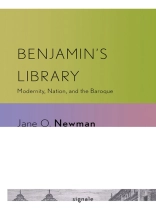In Benjamin’s Library, Jane O. Newman offers, for the first time in any language, a reading of Walter Benjamin’s notoriously opaque work, Origin of the German Tragic Drama that systematically attends to its place in discussions of the Baroque in Benjamin’s day. Taking into account the literary and cultural contexts of Benjamin’s work, Newman recovers Benjamin’s relationship to the ideologically loaded readings of the literature and political theory of the seventeenth-century Baroque that abounded in Germany during the political and economic crises of the Weimar years.
To date, the significance of the Baroque for Origin of the German Tragic Drama has been glossed over by students of Benjamin, most of whom have neither read it in this context nor engaged with the often incongruous debates about the period that filled both academic and popular texts in the years leading up to and following World War I. Armed with extraordinary historical, bibliographical, philological, and orthographic research, Newman shows the extent to which Benjamin participated in these debates by reconstructing the literal and figurative history of sixteenth- and seventeenth-century books that Benjamin analyzes and the literary, art historical and art theoretical, and political theological discussions of the Baroque with which he was familiar. In so doing, she challenges the exceptionalist, even hagiographic, approaches that have become common in Benjamin studies. The result is a deeply learned book that will infuse much-needed life into the study of one of the most influential thinkers of the twentieth century.
Inhaltsverzeichnis
Preface
Acknowledgments
Textual NoteIntroduction: Benjamin’s Baroque: A Lost Object?1. Inventing the Baroque: A Critical History of Nineteenth- and Early Twentieth-Century Debates
The Renaissance of the German Baroque in the ‚Epistemo-Critical Prologue‘
Locating Baroque Style
Origin and the ‚Heroic‘ Age of the German Literary Baroque2. The Plays Are the Thing: Textual Politics and the German Drama
The Origin of the Silesian School: Nationalism and the Baroque Tragic Drama
Collecting the Baroque: Editing the German Dramatic Tradition
The Task of the Translator: Shakespeare as German Tragic Drama3. Melancholy Germans: War Theology, Allegory, and the Lutheran Baroque
Benjamin’s Hamlet in the Crosshairs of War Theology
Reforming the Baroque: Benjamin on Warburg on Luther
Allegory, Emblems, and Gryphius’s Catharina von Georgien Conclusion: Baroque Legacies: National Socialism’s BenjaminBibliography
Index
Über den Autor
Jane O. Newman is Professor of Comparative Literature at the University of California, Irvine. She is the author of Pastoral Conventions: Poetry, Language, and Thought in Seventeenth-Century Nuremberg and The Intervention of Philology: Gender, Learning, and Power in Lohenstein’s Roman Plays.












